- Home
- Clive Barker
Imajica 01 - The Fifth Dominion
Imajica 01 - The Fifth Dominion Read online
Imajica 01 - The Fifth Dominion
Clive Barker
Barker, Clive
Imajica 01 - The Fifth Dominion
1
IT WAS THE PIVOTAL TEACHING of Pluthero Quexos, the most celebrated dramatist of the Second Dominion, that in any fiction, no matter how ambitious its scope or profound its theme, there was only ever room for three players. Between warring kings, a peacemaker; between adoring spouses, a seducer or a child. Between twins, the spirit of the womb. Between lovers, Death. Greater numbers might drift through the drama, of course—thousands in fact—but they could only ever be phantoms, agents, or, on rare occasions, reflections of the three real and self-willed beings who stood at the center. And even this essential trio would not remain intact; or so he taught. It would steadily diminish as the story unfolded, three becoming two, two becoming one, until the stage was left deserted.
Needless to say, this dogma did not go unchallenged. The writers of fables and comedies were particularly vociferous in their scorn, reminding the worthy Quexos that they invariably ended their own tales with a marriage and a feast. He was unrepentant. He dubbed them cheats and told them they were swindling their audiences out of what he called the last great procession, when, after the wedding songs had been sung and the dances danced, the characters took their melancholy way off into darkness, following each other into oblivion.
It was a hard philosophy, but he claimed it was both immutable and universal, as true in the Fifth Dominion, called Earth, as it was in the Second.
And more significantly, as certain in life as it was in art.
Being a man of contained emotion, Charlie Estabrook had little patience with the theater. It was, in his bluntly stated opinion, a waste of breath: indulgence, flummery, lies. But had some student recited Quexos' First Law of Drama to him this cold November night he would have nodded grimly and said: Ail true, all true. It was his experience precisely. Just as Quexos1 Law required, his story had begun with a trio: himself, John Furie Zacharias, and, between them, Judith. That arrangement hadn't lasted very long. Within a few weeks of setting eyes on Judith he had managed to supersede Zacharias in her affections, and the three had dwindled to a blissful two. He and Judith had married and lived happily for five years, until, for reasons he still didn't understand, their joy had foundered, and the two had become one.
He was that one, of course, and the night found him sitting in the back of a purring car being driven around the frosty streets of London in search of somebody to help him finish the story. Not, perhaps, in a fashion Quexos would have approved of—the stage would not be left entirely empty—but one which would salve Estabrook's hurt.
He wasn't alone in his search. He had the company of one half-trusted soul tonight: his driver, guide, and procurer, the ambiguous Mr. Chant. But despite Chant's shows of empathy, he was still just another servant, content to attend upon his master as long as he was promptly paid. He didn't understand the profundity of Estabrook's pain; he was too chilly, too remote. Nor, for all the length of his family history, could Estabrook turn to his lineage for comfort. Although he could trace his ancestors back to the reign of James the First, he had not been able to find a single man on that tree of immoralities—even to the bloodiest root—who had caused, either by his hand or hiring, what he, Estabrook, was out this midnight to contrive: the murder of his wife.
When he thought of her (when didn't he?) his mouth was dry arid his palms were wet; he sighed; he shook. She was in his mind's eye now, like a fugitive from some more perfect place. Her skin was flawless and always cool, always pale; her body was long, like her hair, like her fingers, like her laughter; and her eyes, oh, her eyes, had every season of leaf in them: the twin greens of spring and high summer, the golds of autumn, and, in her rages, black midwinter rot.
He was, by contrast, a plain man: well scrubbed but plain. He'd made his fortune selling baths, bidets and toilets, which lent him little by way of mystique. So, when he'd first laid eyes on Judith—she'd been sitting behind a desk at his accountant's office, her beauty all the more luminous for its drab setting—his first thought was: I want this woman; his second: She won't want me. There was, however, an instinct in him when it came to Judith that he'd never experienced with any other woman. Quite simply, he felt she belonged to him, and that if he turned his wit to it, he could win her.
His courtship had begun the day they'd met, with the first of many small tokens of affection delivered to her desk. But he sooned learned that such bribes and blandishments would not help his case. She politely thanked him but told him they weren't welcome. He dutifully ceased to send presents and, instead, began a systematic investigation of her circumstances. There was precious little to learn. She lived simply, her small circle vaguely bohemian. But among that circle he discovered a man whose claim upon her preceded his own, and to whom she was apparently devoted. That man was John Furie Zacharias, known universally as Gentle, and he had a reputation as a lover that would have driven Estabrook from the field had that strange certainty not been upon him. He decided to be patient and await his moment. It would come.
Meanwhile he watched his beloved from afar, conspiring to encounter her accidentally now and again, and researching his antagonist's history. Again, there was little to learn. Zacharias was a minor painter, when he wasn't living off his mistresses, and reputedly a dissolute. Of this Estabrook had perfect proof when, by chance, he met the fellow. Gentle was as handsome as his legends suggested, but looked, Charlie thought, like a man just risen from a fever. There was something raw about him—his body sweated to its essence, his face betraying a hunger behind its symmetry—that lent him a bedeviled look.
Half a week after that encounter, Charlie had heard that his beloved had parted from the man with great grief and was in need of tender care. He'd been quick to supply it, and she'd come into the comfort of his devotion with an ease that suggested his dreams of possession had been well founded.
His memories of that triumph had, of course, been soured by her departure, and now it was he who wore the hungry, yearning look he'd first seen on Furie's face. It suited him less well than it had Zacharias. His was not a head made for haunting. At fifty-six, he looked sixty or more, his features as solid as Gentle's were spare, as pragmatic as Gentle's were rarefied. His only concession to vanity was the delicately curled mustache beneath his patrician nose, which concealed an upper lip he'd thought dubiously ripe in his youth, leaving the lower to jut in lieu of a chin.
Now, as he rode through the darkened streets, he caught sight of that face in the window and perused it ruefully. What a mockery he was! He blushed to think of how shamelessly he'd paraded himself when he'd had Judith on his arm; how he'd joked that she loved him for his cleanliness, and for his taste in bidets. The same people who'd listened to those jokes were laughing in earnest now, were calling him ridiculous. It was unbearable. The only way he knew to heal the pain of his humiliation was to punish her for the crime of leaving him.
He rubbed the heel of his hand against the window and peered out.
"Where are we?" he asked Chant.
"South of the river, sir."
"Yes, but where?"
"Streatham."
Though he'd driven through this area many times—he had a warehouse in the neighborhood—he recognized none of it. The city had never looked more foreign or more unlovely.
"What sex is London, do you suppose?" he mused.
"I hadn't ever thought," Chant said.
"It was a woman once," Estabrook went on. "One calls a city she, yes? But it doesn't seem very feminine any more.'1
"She'll be a lady again in spring," Chant replied.
"I don't think a few crocuse
s in Hyde Park are going to make much difference," Estabrook said. "The charm's gone out of it." He sighed. "How far now?"
"Maybe another mile."
"Are you sure your man's going to be there?"
"Of course."
"You've done this a lot, have you? Been a go-between, I mean. What did you call it... a facilitator?"
"Oh, yes," Chant said. "It's in my blood." That blood was not entirely English. Chant's skin and syntax carried traces of the immigrant. But Estabrook had grown to trust him a little, even so.
"Aren't you curious about all of this?" he asked the man.
"It's not my business, sir. You're paying for the service, and I provide it. If you wanted to tell me your reasons—"
"As it happens, I don't."
"I understand. So it would be useless for me to be curious, yes?"
That was neat enough, Estabrook thought. Not to want what couldn't be had no doubt took the sting from things. He might need to learn the trick of that before he got too much older; before he wanted time he couldn't have. Not that he demanded much in the way of satisfactions. He'd not been sexually insistent with Judith, for instance. Indeed, he'd taken as much pleasure in the simple sight of her as he'd taken in the act of love. The sight of her had pierced him, making her the enterer, had she but known it, and him the entered. Perhaps she had known, on reflection. Perhaps she'd fled from his passivity, from his ease beneath the spike of her beauty. If so, he would undo her revulsion with tonight's business. Here, in the hiring of the assassin, he would prove himself. And, dying, she would realize her error. The thought pleased him. He allowed himself a little smile, which vanished from his face when he felt the car slowing and glimpsed, through the misted window, the place the facilitator had brought him to.
A wall of corrugated iron lay before them, its length daubed with graffiti. Beyond it, visible through gaps where the iron had been torn into ragged wings and beaten back, was a junkyard in which trailers were parked. This was apparently their destination.
"Are you out of your mind?" he said, leaning forward to take hold of Chant's shoulder. "We're not safe here."
"I promised you the best assassin in England, Mr. Esta-brook, and he's here. Trust me, he's here."
Estabrook growled in fury and frustration. He'd expected a clandestine rendezvous—curtained windows, locked doors—not a gypsy encampment. This was altogether too public and too dangerous. Would it not be the perfect irony to be murdered in the middle of an assignation with an assassin?
He leaned back against the creaking leather of his seat and said, "You've let me down."
"I promise you this man is a most extraordinary individual," Chant said. "Nobody in Europe comes remotely close. I've worked with him before."
"Would you care to name the victims?"
Chant looked around at his employer and, in faintly admonishing tones, said, "I haven't presumed upon your privacy, Mr. Estabrook. Please don't presume upon mine."
Estabrook gave a chastened grunt.
"Would you prefer we go back to Chelsea?" Chant went on. "I can find somebody else for you. Not as good, perhaps, but in more congenial surroundings."
Chant's sarcasm wasn't lost on Estabrook, nor could he resist the recognition that this was not a game he should have entered if he'd hoped to stay lily-white. "No, no," he said. "We're here, and I may as well see him. What's his name?"
"I only know him as Pie," Chant said.
"Pie? Pie what?"
"Just Pie."
Chant got out of the car and opened Estabrook's door.
Icy air swirled in, bearing a few flakes of sleet. Winter was eager this year. Pulling his coat collar up around his nape and plunging his hands into the minty depths of his pockets, Estabrook followed his guide through the nearest gap in the corrugated wall. The wind carried the tang of burning timber from an almost spent bonfire set among the trailers: that, and the smell of rancid fat.
"Keep close," Chant advised, "walk briskly, and don't show too much interest. These are very private people."
"What's your man doing here?" Estabrook demanded to know. "Is he on the run?"
"You said you wanted somebody who couldn't be traced. 'Invisible' was the word you used. Pie's that man. He's on no files of any kind. Not the police, not the Social Security. He's not even registered as born."
"I find that unlikely."
"I specialize in the unlikely," Chant replied.
Until this exchange the violent turn in Chant's eye had never unsettled Estabrook, but it did now, preventing him as it did from meeting the other man's gaze directly. This tale he was telling was surely a lie. Who these days got to adulthood without appearing on a file somewhere? But the thought of meeting a man who even believed himself undocumented intrigued Estabrook. He nodded Chant on, and together they headed over the ill-lit and squalid ground.
There was debris dumped every side: the skeletal hulks of rusted vehicles; heaps of rotted household refuse, the stench of which the cold could not subdue; innumerable dead bonfires. The presence of trespassers had attracted some attention. A dog with more breeds in its blood than hairs on its back foamed and yapped at them from the limit of its rope; the curtains of several trailers were drawn back by shadowy witnesses; two girls in early adolescence, both with hair so long and blond they looked to have been baptized in gold (unlikely beauty, in such a place) rose from beside the fire, one running as if to alert guards, the other watching the newcomers with a smile somewhere between the seraphic and the cretinous.
"Don't stare," Chant reminded him as he hurried on, but Estabrook couldn't help himself.
An albino with white dreadlocks had appeared from one of the trailers with the blond girl in tow. Seeing the strangers he let out a shout and headed towards them.
Two more doors now opened, and others emerged from their trailers, but Estabrook had no chance to either see who they were or whether they were armed because Chant again said, "Just walk, don't look. We're heading for the caravan with the sun painted on it. See it?"
"I see it."
There were twenty yards still to cover. Dreadlocks was delivering a stream of orders now, most of them incoherent but surely intended to stop them in their tracks. Estabrook glanced across at Chant, who had his gaze fixed on their destination and his teeth clenched. The sound of footsteps grew louder behind them. A blow on the head or a knife in the ribs couldn't be far off.
"We're not going to make it," Estabrook said.
Within ten yards of the trailer—the albino at their shoulders—the door ahead opened, and a woman in a dressing gown, with a baby in her arms, peered out. She was small and looked so frail it was a wonder she could hold the child, who began bawling as soon as the cold found it. The ache of its complaint drove their pursuers to action. Dreadlocks took hold of Estabrook's shoulder and stopped him dead. Chant—wretched coward that he was—didn't slow his pace by a beat but strode on towards the trailer as Estabrook was swung around to face the albino. This was his perfect nightmare, to be facing scabby, pockmarked men like these, who had nothing to lose if they gutted him on the spot. While Dreadlocks held him hard, another man—gold incisors glinting—stepped in and pulled open Estabrook's coat, then reached in to empty his pockets with the speed of an illusionist. This was not simply professionalism. They wanted their business done before they were stopped.
As the pickpocket's hand pulled out his victim's wallet, a voice came from the trailer behind Estabrook: "Let the Mister go. He's real."
Whatever the latter meant, the order was instantly obeyed, but by that time the thief had whipped Estabrook's wallet into his own pocket and had stepped back, hands raised to show them empty. Nor, despite the fact that the speaker—presumably Pie—was extending his protection to his guest, did it seem circumspect to try and reclaim the wallet. Estabrook retreated from the thieves, lighter in step and cash but glad to be doing so at all.
Turning, he saw Chant at the trailer door, which was open. The woman, the baby, and the speaker had
already gone back inside.
'They didn't hurt you, did they?" Chant said.
Estabrook glanced back over his shoulder at the thugs, who had gone to the fire, presumably to divide the loot by its light. "No," he said. "But you'd better go and check the car, or they'll have it stripped."
"First I'd like to introduce you—"
"Just check the car," Estabrook said, taking some satisfaction in the thought of sending Chant back across the no-man's-land between here and the perimeter. "I can introduce myself."
"As you like."
Chant went off, and Estabrook climbed the steps into the trailer. A scent and a sound met him, both sweet. Oranges had been peeled, and their dew was in the air. So was a lullaby, played on a guitar. The player, a black man, sat in the farthest corner, in a shadowy place beside a sleeping child. The babe lay to his other side, gurgling softly in a simple cot, its fat arms raised as if to pluck the music from the air with its tiny hands. The woman was at a table at the other end of the vehicle, tidying away the orange peel. The whole interior was marked by the same fastidiousness she was applying to this task, every surface neat and polished.
"You must be Pie," Estabrook said.
"Please close the door," the guitar player said. Estabrook did so. "And sit down. Theresa? Something for the gentleman. You must be cold."
The china cup of brandy set before him was like nectar. He downed it in two throatfuls, and Theresa instantly replenished it. He drank again with the same speed, only to ; have his cup furnished with a further draft. By the time Pie had played both the children to sleep and rose to come and join his guest at the table, the liquor had brought a pleasant buzz to Estabrook's head.
In his life Estabrook had known only two other black men by name. One was the manager of a tiling manufacturer in Swindon, the other a colleague of his brother's: neither of them men he'd wished to know better. He was of an age and class that still swilled the dregs of colonialism at two in the morning, and the fact this man had black blood in him (and, he guessed, much else besides) counted as another mark against Chant's judgment. And yet—perhaps it was the brandy—he found the fellow opposite him intriguing. Pie didn't have the face of an assassin. It wasn't dispassionate, but distressingly vulnerable; even (though Estabrook would never have breathed this aloud) beautiful. Cheeks high, lips full, eyes heavily lidded. His hair, mingled black and blond, fell in Italianate profusion, knot- ted ringlets to his shoulders. He looked older than Estabrook would have expected, given the age of his children. Perhaps only thirty, but wearied by some excess or other, the burnished sepia of his skin barely concealing a sickly iridescence, as though there were a mercurial taint in his cells. It made him difficult to fix, especially for eyes awash with brandy, the merest motion of his head breaking subtle ; waves against his bones, their spume draining back into his skin trailing colors Estabrook had never seen in flesh before.

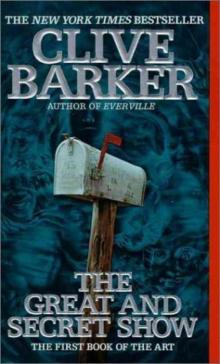 The Great and Secret Show
The Great and Secret Show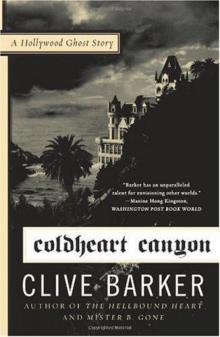 Coldheart Canyon: A Hollywood Ghost Story
Coldheart Canyon: A Hollywood Ghost Story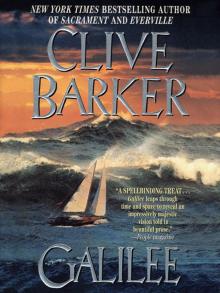 Galilee
Galilee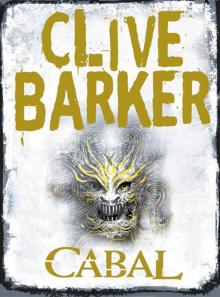 Cabal
Cabal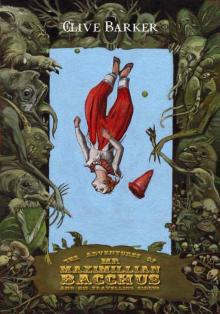 The Adventures of Mr. Maximillian Bacchus and His Travelling Circus
The Adventures of Mr. Maximillian Bacchus and His Travelling Circus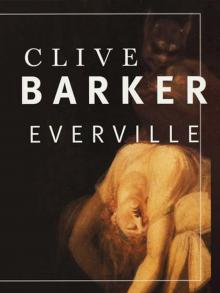 Everville
Everville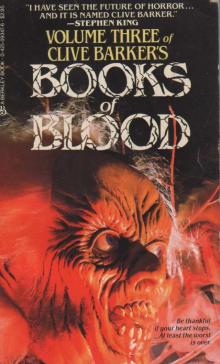 Books of Blood: Volume Three
Books of Blood: Volume Three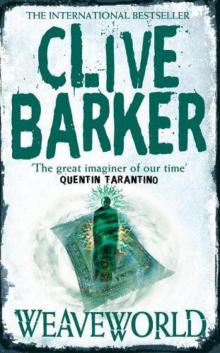 Weaveworld
Weaveworld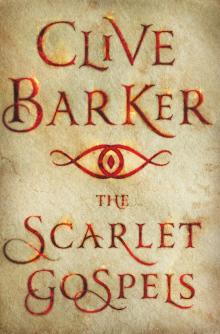 The Scarlet Gospels
The Scarlet Gospels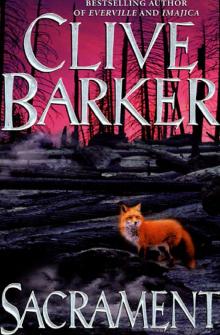 Sacrament
Sacrament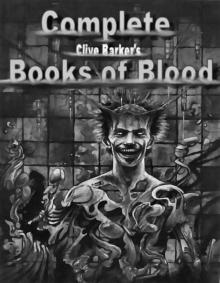 Books of Blood: Volumes 1-6
Books of Blood: Volumes 1-6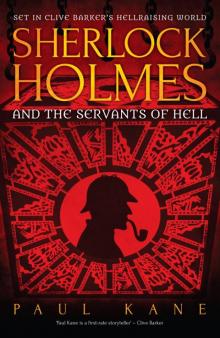 Sherlock Holmes and the Servants of Hell
Sherlock Holmes and the Servants of Hell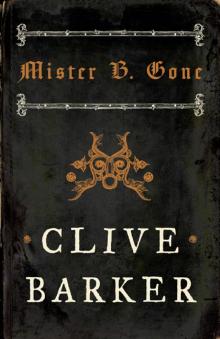 Mister B. Gone
Mister B. Gone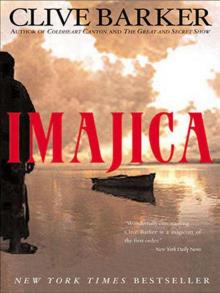 Imajica
Imajica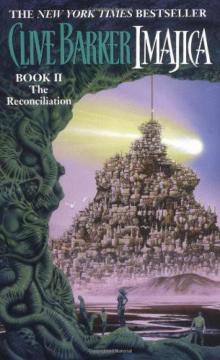 The Reconciliation
The Reconciliation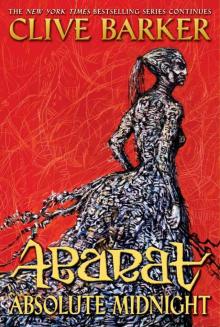 Abarat
Abarat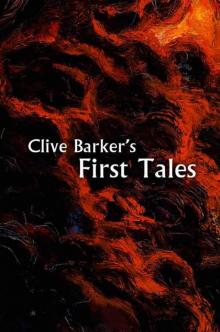 Clive Barker's First Tales
Clive Barker's First Tales The Hellbound Heart
The Hellbound Heart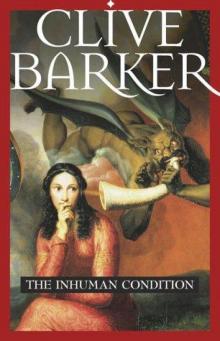 The Inhuman Condition
The Inhuman Condition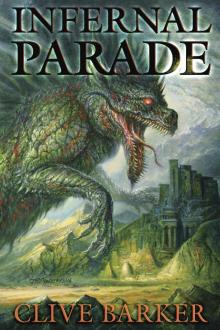 Infernal Parade
Infernal Parade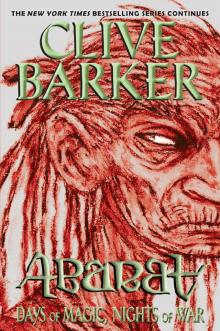 Days of Magic, Nights of War
Days of Magic, Nights of War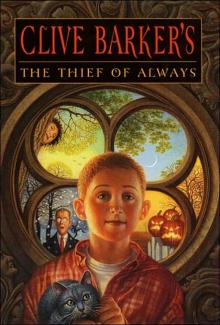 The Thief of Always
The Thief of Always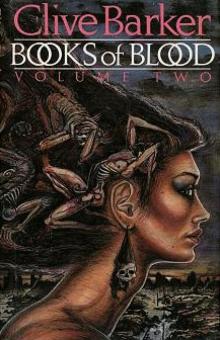 Books of Blood Vol 2
Books of Blood Vol 2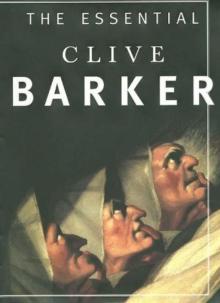 The Essential Clive Barker
The Essential Clive Barker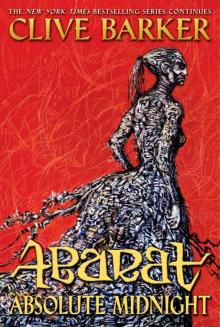 Abarat: Absolute Midnight a-3
Abarat: Absolute Midnight a-3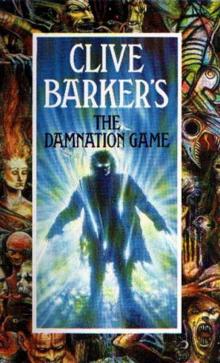 The Damnation Game
The Damnation Game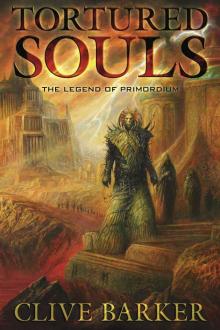 Tortured Souls: The Legend of Primordium
Tortured Souls: The Legend of Primordium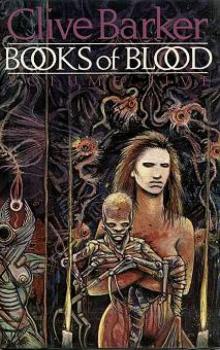 Books of Blood Vol 5
Books of Blood Vol 5 Imajica 02 - The Reconciliator
Imajica 02 - The Reconciliator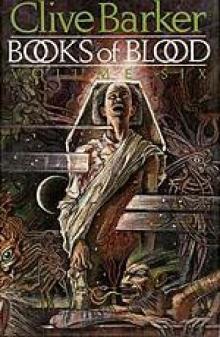 Books Of Blood Vol 6
Books Of Blood Vol 6 Imajica 01 - The Fifth Dominion
Imajica 01 - The Fifth Dominion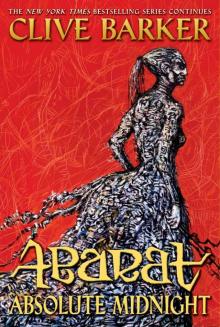 Abarat: Absolute Midnight
Abarat: Absolute Midnight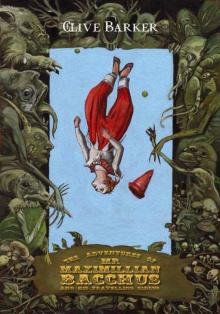 The Adventures of Mr. Maximillian Bacchus & His Traveling Circus
The Adventures of Mr. Maximillian Bacchus & His Traveling Circus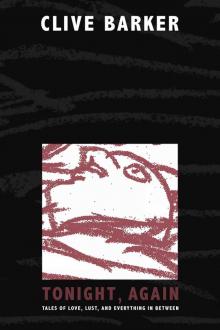 Tonight, Again
Tonight, Again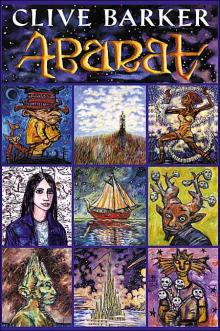 Abarat: The First Book of Hours a-1
Abarat: The First Book of Hours a-1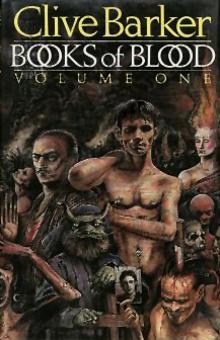 Books Of Blood Vol 1
Books Of Blood Vol 1 Age of Desire
Age of Desire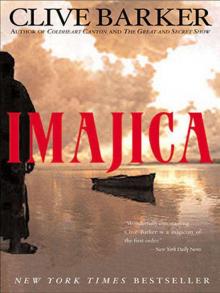 Imajica: Annotated Edition
Imajica: Annotated Edition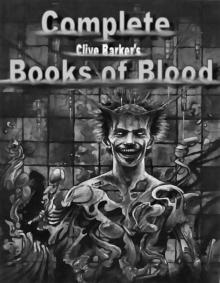 Complete Books of Blood
Complete Books of Blood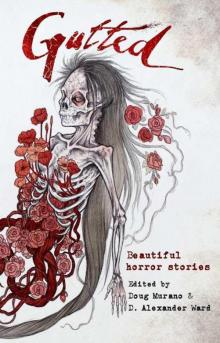 Gutted: Beautiful Horror Stories
Gutted: Beautiful Horror Stories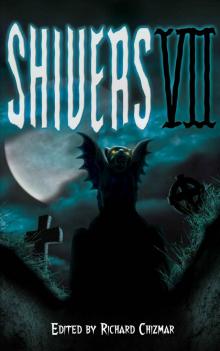 Shivers 7
Shivers 7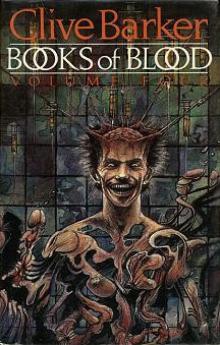 Books Of Blood Vol 4
Books Of Blood Vol 4